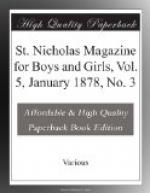When the embassy reached Paris, and the offer of marriage had been formally accepted, the archbishop and the earls asked to see the little princess who was soon to become their queen. At first the French Council refused, saying so young a child was not prepared to appear on public occasions, and they could not tell how she might behave. The English noblemen were so solicitous, however, that at last she was brought before them. The earl marshal immediately knelt before her, and said, in the old-fashioned language of the time: “Madam, if it please God, you shall be our lady and queen.”
Queen Isabeau stood at a little distance, curious and anxious, no doubt, to know how her little daughter would answer this formal address. To her great pleasure, and the great surprise of all present, Princess Isabella replied:
“Sir, if it please God and my father that I be Queen of England, I shall be well pleased, for I am told I shall then be a great lady.”
Then, giving the marshal her tiny hand to kiss, she bade him rise from his knees, and leading him to her mother, she presented him to her with the grace and ease of a mature woman.
According to the fashion of the time, Princess Isabella was immediately married by proxy, and received the title of Queen of England. Froissart, a celebrated historian living at that epoch, says: “It was very pretty to see her, young as she was, practicing how to act the queen.”
In a few days, King Richard arrived from England with a gay and numerous retinue of titled ladies to attend his little bride. After many grand festivities they were married and were taken in state to England, where the Baby Queen was crowned in the famous Westminster Abbey.
I must not forget to describe the magnificent trousseau that the King of France gave his little daughter. Her dowry was 800,000 francs ($160,000); her coronets, rings, necklaces, and jewelry of all sorts, were worth 500,000 crowns; and her dresses were of surpassing splendor. One was a robe and mantle of crimson velvet, trimmed with gold birds perched on branches of pearls and emeralds, and another was trimmed with pearl roses. Do you think any fairy princess could have had a finer bridal outfit?
When the ceremonies of the coronation were over, little Isabella’s life became a quiet routine of study; for, although a reigning sovereign, she was in the position of that young Duchess of Burgundy of later years, who at the time of her marriage could neither read nor write. This duchess, who married a grandson of Louis XIV. of France, was older than Queen Isabella—thirteen years old; and as soon as the wedding festivities were over, she was sent to school in a convent, to learn at least to read, as she knew absolutely nothing save how to dance. Queen Isabella, however, was not sent away to school, but was placed under the care of a very accomplished lady, a cousin of the king, who acted as her governess. In her leisure hours, the king, who was a fine musician, would play and sing for her, and, history gravely informs us, he would even play dolls with her by the hour!




